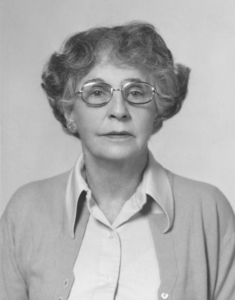Ara Cary
Life Dates: b. January 12, 1906, d. May 18, 2001
Full Name: Ara S. (Charbonneau) Cary
Birthplace: Detroit, MI
Tags: Social Work, Volunteerism, Women’s Clubs, Oral History
Ara Cary was born in Detroit, MI, and could trace her family history back three generations. In 1928, she graduated from the University of Wisconsin with a teaching degree in history and economics. Upon graduation, Ara began her teaching career with a job in Evansville, WI. Then she moved back to Detroit and taught for 3 more years. At that point, although she had seniority of one year, Ara lost her job to a man who was married and had children. “The fact that I was also supporting my mother had absolutely nothing to do with the situation, and I think that’s the difference between the 1930s and the 1980s and 70s. . . . Sex discrimination [then], and now we have equality so-called,” Ara concluded.
To find another teaching job, she moved to Ridgewood, NJ, “which was an ultra-rich, nouveau rich bedroom [community] of New York [City] . . . .” Ara taught for 2 years and then got a job with the Emergency Relief Administration, which was established under Roosevelt in his first term. “I was there for 3 months. Loved it. It was the most fascinating experience. I couldn’t believe the poverty that I [saw]. . . .”
Ara again moved back to Detroit and worked for the Public Welfare Department for 8 months. Then she went to the Family Services Agency in Wyandotte and worked there for 15 years. In 1935, she was in the first class in the School of Social Work at the University of Michigan. “I never lost a day’s pay . . . and I did it bit by bit . . .” and eventually earned a master’s degree.
In 1950, Ara married John Cary, an attorney and “Lincoln historian.” She also became the step-mother of two late adolescent boys, John, Jr. and Robert. They family soon moved to Grand Rapids, MI. “I loved it right from the get go,” she said. “I knew I had a reputation in the Detroit area, but I was here about 2 months when . . . Dr. Ann Cronick called and asked me if I would come and talk to them about a temporary job. Would I come? I nearly knocked the door down to get there.”
In 1951, Ara joined the Child Guidance Center as a case worker. By 1953, she was its director. Her first initiative was the Child Study Project, which was sponsored by the Junior League for 3 years. Then, “we had a royal fight and . . . won with the Department of Mental Health in Lansing and . . . got [the project] established as a permanent part of the clinic,” said Ara.
The project was then renamed “The Well Child Program,” and, according to Ara, it was “open to mothers in the community with children between 3 and 5 who had not ever gone to a nursery school.” In separate rooms, the children could see their mothers through a glass wall and the mothers could observe their children through a one-way mirror. The program ran once a week for 10 weeks. Ara said about a third of the children and their mothers were asked to take the program for another 10 weeks. Another third needed more intense intervention and therapy. And the last third was just great and required nothing more from the clinic. It was also mentioned in this interview that Bunny Voss, the interviewer, and Ara Cary started the city’s first day care center for working mothers.
When the plans were made to build a new a new facility, Ara stepped down to become the assistant director in charge of practice, which meant she hired and supervised the clinical staff. “I decided I [didn’t] want to build a building, so . . . Jerry VanderTuig became the director,” she recalled.
In addition to her social work, Ara taught in the School of Social Work at the University of Michigan from the early 1940s through to the 1970s. At first she taught on the Ann Arbor, MI, campus, but by the 1960s and 1970s, she was an instructor in the university’s extension program in Grand Rapids.
After she “quit,” not retired from, the Child Guidance Center, Ara practiced privately in her home for 12 – 15 hours a week. Her clients were mainly professional adults. At that time, she also volunteered on the YWCA board, the United Way Planning Division, and Junior League. Furthermore, Ara chaired and expanded the SCAN (Suspected Child Abuse and Neglect) committee of the board of D. A. Blodgett Homes for Children. That committee, according to Ara, was the predecessor of the Council of Child Abuse and Neglect.
Sources
This biography is a summary of a transcript of an oral history interview with Ara Cary. Learn more about Grand Rapids women’s oral histories here.
“Ara Cary.” 1983. Grand Rapids Public Museum.

